Key takeaways:
- Selective mutism is an anxiety disorder that affects children’s ability to speak in certain social situations, highlighting the importance of understanding the emotional struggles behind their silence.
- Building supportive relationships is crucial for individuals with selective mutism, as trust and connection can alleviate anxiety and foster communication.
- Effective communication techniques, such as active listening and using written expression, can significantly enhance interactions for those navigating selective mutism.
- Celebrating small victories and seeking mentorship can encourage personal growth, emphasizing the importance of recognizing progress in overcoming challenges.

Understanding Selective Mutism
Selective mutism is a complex anxiety disorder that primarily affects children, manifesting as an inability to speak in specific social situations despite speaking comfortably in other environments, like at home. I recall how my friend’s child would chatter away at family gatherings but turn silent in school, leaving everyone puzzled about the disparity. Have you ever witnessed someone so articulate in one setting yet completely withdrawn in another?
This condition typically emerges during childhood, often tied closely to social anxiety. I remember feeling the weight of expectation when talking with new people, and I can empathize deeply with those navigating similar challenges. The silence can feel overwhelming, almost like a heavy blanket that suffocates attempts to connect.
Understanding selective mutism means acknowledging that it’s not simply refusal to speak; rather, it’s a profound struggle characterized by fear and discomfort. Have you thought about the emotional turmoil behind that silence? I’ve come to realize that each silence tells a story—one filled with hidden fears, unspoken thoughts, and the desire for connection that is so strong yet so hard to express.
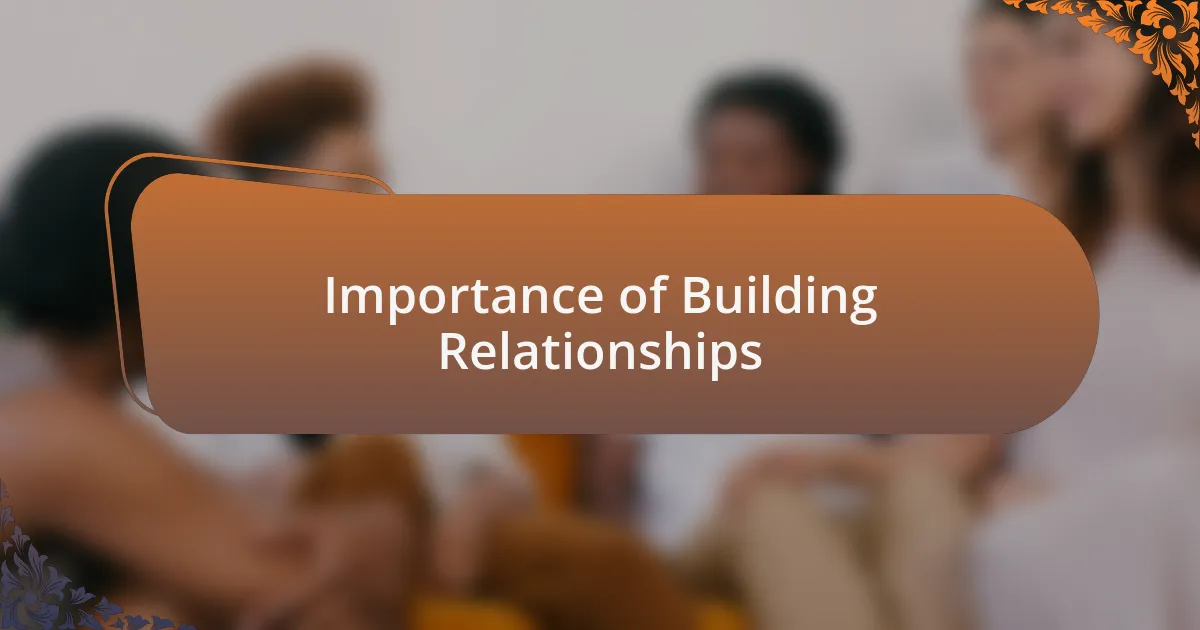
Importance of Building Relationships
Building relationships is essential, especially for those affected by selective mutism. I’ve seen how a supportive friend can be a lifeline, offering a safe space where someone can express themselves without judgment. Have you ever felt that deep sense of relief when someone just listens? I know I have, and it reinforces the idea that connection can act as a balm for anxiety.
The significance of relationships goes beyond mere social interaction; they serve as bridges for understanding and healing. I remember my own journey of slowly opening up to a mentor who patiently encouraged me to share my thoughts. That gradual trust built a foundation that allowed me to explore not just my voice but also my emotions. Isn’t it interesting how a single connection can ignite a spark of confidence?
Moreover, nurturing relationships fosters a sense of belonging, which is crucial for emotional well-being. I’ve witnessed the transformation in people who have found their tribe—how they thrive in environments where they feel accepted. Isn’t it heartwarming to realize that, through authentic connections, barriers can be dismantled, paving the way for meaningful expression?
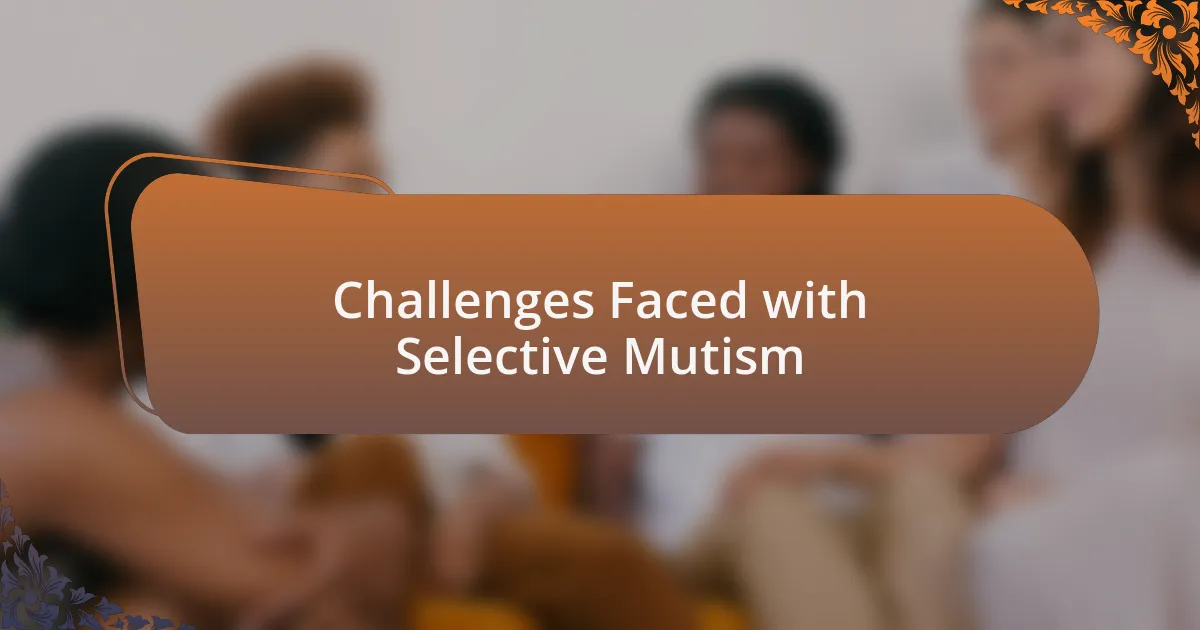
Challenges Faced with Selective Mutism
Living with selective mutism can present unique social hurdles that often feel overwhelming. One challenge I’ve encountered is the pressure to communicate in high-stakes situations, like classroom settings or group activities. It’s that heart-racing moment when you want to speak but feel as if your voice is trapped, leading to feelings of isolation. Have you ever been in a room full of people but felt completely alone? I know I have, and it’s a jarring experience.
Navigating everyday interactions can also be daunting. Simple greetings or casual conversations often turn into a complex web of emotions and self-doubt. I recall a time when I was invited to a friend’s party; the overwhelming noise and clamor made it difficult to even say hello, leaving me feeling small and hidden. Sometimes, the fear of misunderstanding or judgment can amplify the struggle, making interactions feel like a minefield rather than a pathway to connection.
Additionally, the misconceptions surrounding selective mutism can exacerbate feelings of frustration. People often misinterpret silence as rudeness or disinterest. I vividly remember an instance when a well-meaning acquaintance remarked, “Just speak up!” without understanding the deep-seated anxiety that held me back. These experiences highlight the need for public awareness and empathy—how vital it is for others to see the person behind the silence. Don’t you think a little patience can go a long way in building bridges of understanding?
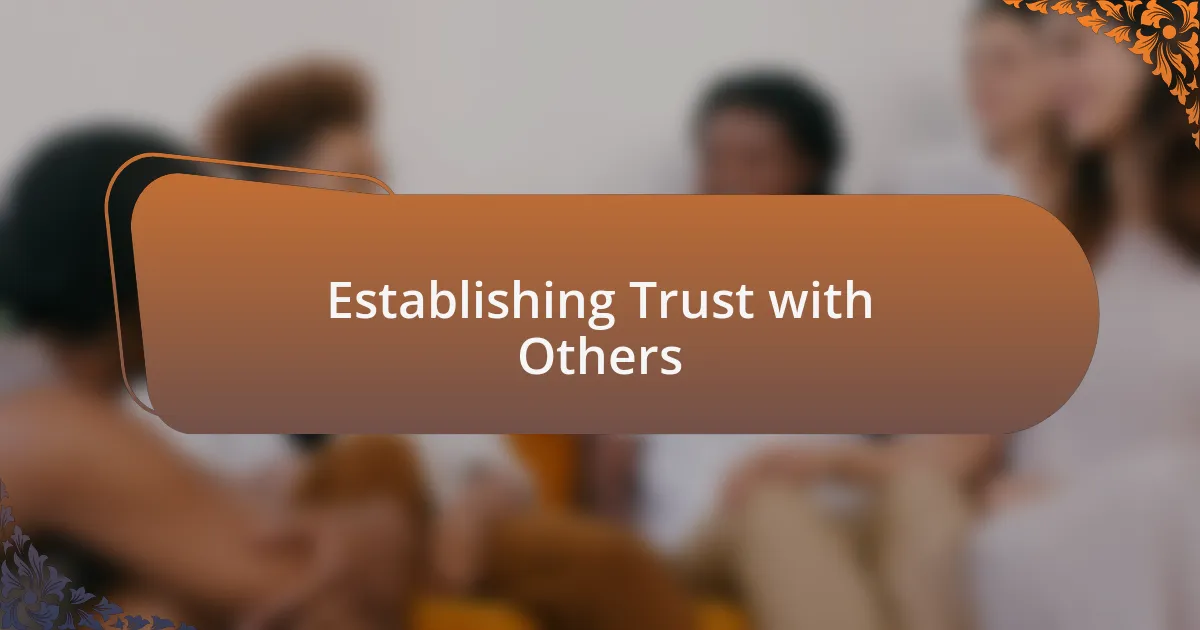
Establishing Trust with Others
Establishing trust can feel like an uphill battle, especially for those of us navigating selective mutism. I remember a time when I was paired with a classmate for a group project; I struggled to express my ideas. Instead of grazing over my silence, my partner took the time to ask questions and truly listen. That willingness to engage made a world of difference—trust started to flourish because he showed he cared. Does it surprise you how powerful a single act of attentiveness can be?
Developing trust also requires vulnerability, which can be daunting when speaking feels like climbing a steep mountain. I once shared my experiences with a close friend who didn’t fully understand selective mutism. Instead of brushing it off, they patiently waited for me to find my words. Their openness helped me lower my guard, proving that sometimes, trust comes from a safe space where silence is as valuable as speech. Have you ever been in a situation where support transformed your experience?
The key is consistent, gentle communication. I’ve found that sharing small bits about myself gradually nurtures the trust needed for deeper conversations. Rather than jumping into heavy discussions, I prefer to start with light topics, allowing trust to build naturally. This breakthrough often leads to richer connections down the line. Have you tried fostering trust in this way? It’s a strategy that can lead to truly meaningful relationships.

Effective Communication Techniques
Effective communication techniques can significantly enhance relationships, especially for those with selective mutism. I recall a time when a supportive mentor encouraged me to write down my thoughts before sharing them verbally. This method not only eased my anxiety but also allowed me to express myself more clearly. Have you ever found it easier to communicate through writing? It can be a game-changer.
Active listening is another powerful tool I’ve learned to value deeply. During a vulnerable conversation, a friend maintained eye contact and nodded, signaling their engagement. This simple act made me feel heard and understood, fostering a deeper connection. Isn’t it fascinating how investing in someone’s words can transform the interaction? I realized then that communication goes beyond speaking; it’s about creating a supportive environment.
Combining verbal and non-verbal cues can be particularly effective. I once attended a social gathering where gestures and facial expressions supplemented conversations, helping everyone feel included. It opened my eyes to how much understanding can occur without words. Have you considered how your body language impacts communication? It often speaks louder than speech itself, bridging gaps for those who find it challenging to vocalize their thoughts.
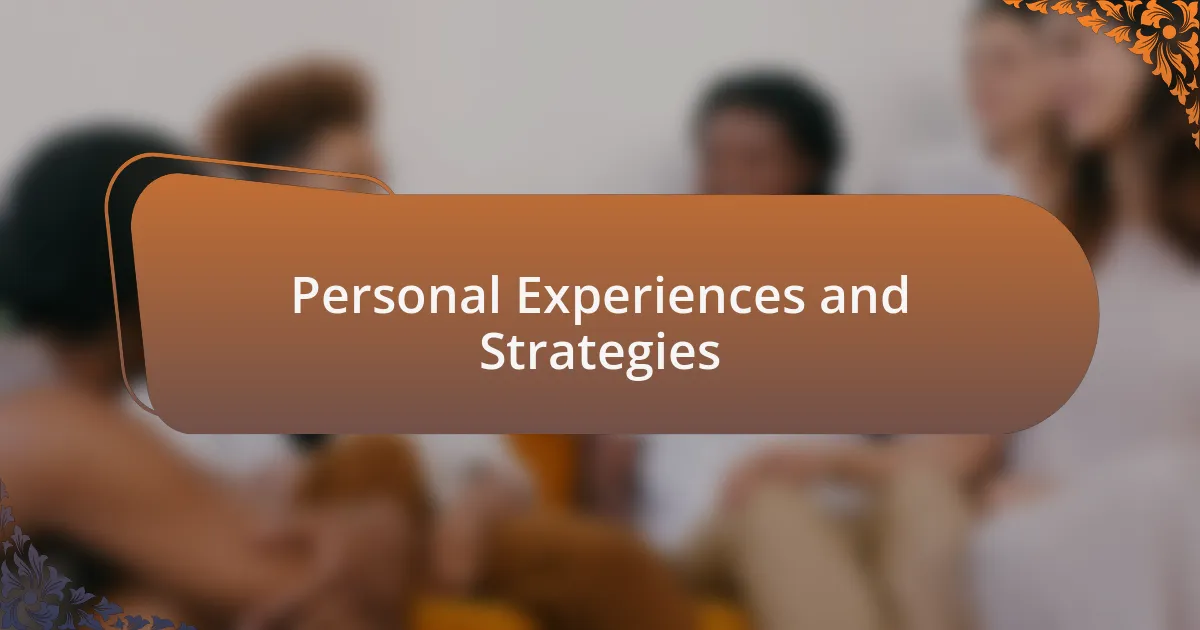
Personal Experiences and Strategies
Building meaningful relationships, especially when navigating selective mutism, often requires genuine patience and understanding. I remember a particularly memorable moment with a coworker who noticed my struggle to speak in group settings. Instead of pushing me to participate, they invited me for one-on-one chats over coffee, creating a comfortable space where I felt safe to express my thoughts. Have you ever had someone go out of their way to make you feel seen? Those small gestures can pave the way for profound connection.
I’ve also found that sharing my experiences with selective mutism can foster empathy and understanding. In a support group, I once opened up about my fears and challenges, and to my surprise, several others related to my feelings. This vulnerability not only strengthened our bond but also encouraged them to share their stories. It’s incredible how sharing our struggles can transform loneliness into community—have you felt that shift in your own life?
Lastly, engaging in shared activities has proven to be an effective strategy for deepening connections. I took part in a local art class despite my hesitations. The focus on creativity over conversation relieved some pressure, enabling me to build friendships naturally over time. How often do we underestimate the power of shared experiences? I learned that through art, laughter, and collaboration, meaningful relationships emerge more effortlessly than in traditional social settings.
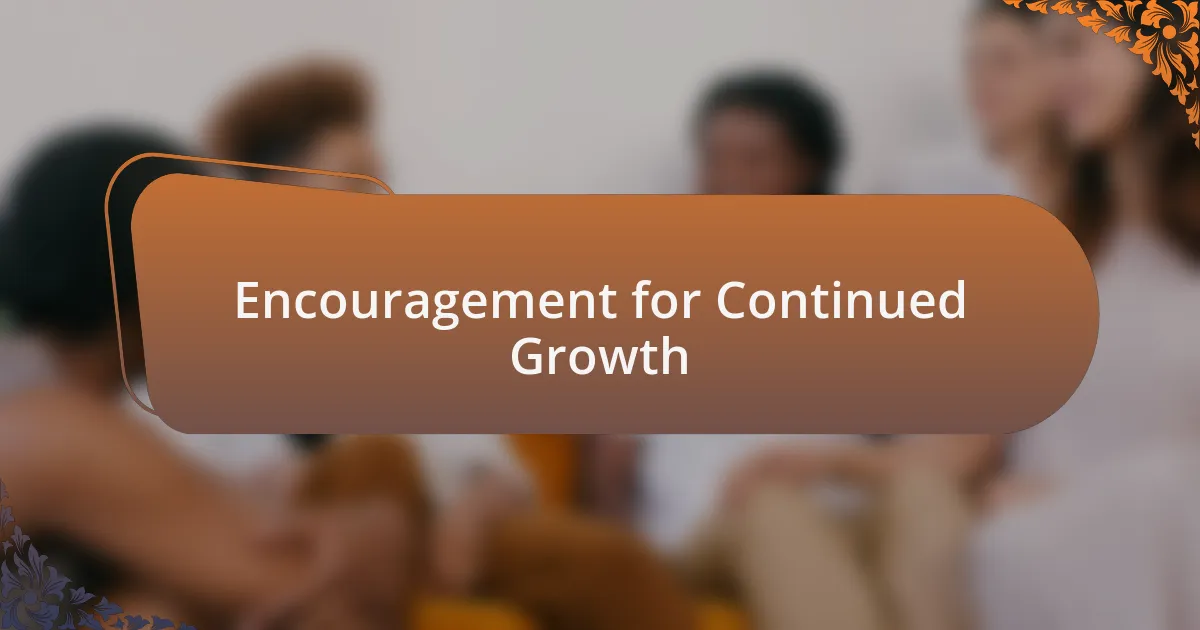
Encouragement for Continued Growth
Encouragement often comes from the smallest interactions, and I remember a time when a simple compliment from a friend ignited a spark within me. They acknowledged my effort to connect, saying, “I see how hard you’re trying, and it inspires me.” That moment reinforced my belief in growth, reminding me that small victories deserve recognition. Have you ever felt that push from someone that made you reconsider your own capabilities?
As I continued my journey, I discovered the power of celebrating progress, no matter how minor it seemed. I started a journal to document my milestones—like speaking up in a meeting, even if it was just a sentence. Looking back at those entries, I realized how far I had come, which inspired me to persevere through the tough days. Have you ever reflected on your journey and felt a surge of motivation to keep moving forward?
Additionally, seeking out mentors and role models played a crucial role in my personal growth. I reached out to someone I admired, who shared similar experiences with selective mutism. Their stories of overcoming obstacles and achieving personal goals filled me with hope and direction. Isn’t it amazing how connecting with those who have walked a similar path can illuminate the way for our own journeys? Their guidance serves as a reminder that growth is a continuous process, and we are never alone in it.